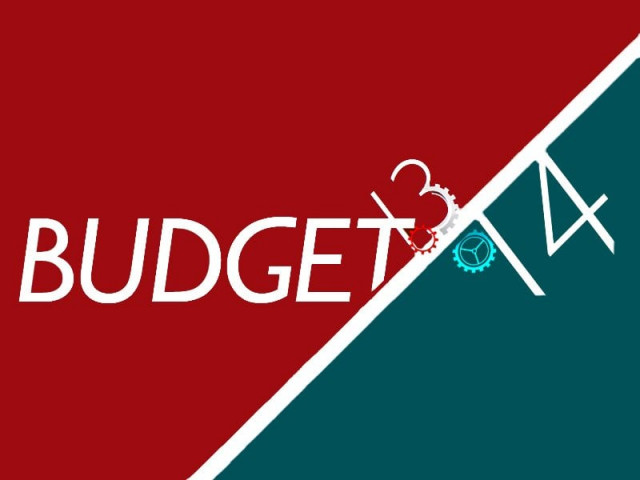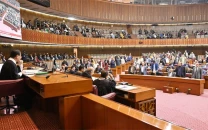A brief look at the possible outcomes of Federal Budget 2013-14
Here are a few pros and cons of the PML-N’s efforts to fix the economy.

The much-criticised one percentage point increase in the General Sales Tax (GST) will undoubtedly have an immense inflationary impact. PHOTO: FILE
The Federal Budget for fiscal 2013-14 includes considerable changes in both expenditure and taxation plans, as well as ambitious targets that will have a momentous effect on the external sector of the economy. However, a most worrisome problem lingers on – that of rising external debt, coupled with minimal foreign exchange reserves. Not only will these exert downward pressure on the rupee, debt servicing costs will also balloon as a result to almost unsustainable levels.
In order to avoid a total collapse of the economy due to an extremely weak currency and the inability to meet external debt obligations, the government must devise a policy to address the issue at the earliest. It must chalk out a strategy for the rescheduling of external debts other than International Monetary Fund (IMF) loans, which cannot be delayed or rescheduled, and it must enter into negotiations with lenders to delay debt repayments in the interest of Pakistan’s already battered and bruised economy.

In his budget speech, the finance minister announced the continuation of some, and the initiation of other major infrastructure projects. The construction of the various highway projects announced will require the import of various large-scale machinery, equipment and raw materials. Locomotives, construction of railway tracks, and the modernisation of communication links for Pakistan Railway will also increase the country’s import bill. Once completed, however, these projects will facilitate trade by reducing the time and cost of transporting exportable items to sea ports and border trading routes on one hand, and of transporting imported goods to local markets on the other.
The government also plans on setting up Export Promotion Zones and industrial estates to inject investment into the industrial sector. Special Economic Zones (SEZs) will be set up, especially one at Gawadar, to provide incentives to traders; thereby giving a much-needed impetus to the growth of trade and commerce.

These policies, if implemented properly, will have a beneficial impact on the balance of trade, since semi-manufactured and finished goods can be exported at significantly lower costs. The finance minister has also proposed an exemption certificate for the import of raw materials by the manufacturing sector, which will again be favourable to export-oriented industries.
The much-criticised one percentage point increase in the General Sales Tax (GST) will undoubtedly have an immense inflationary impact. It remains to be seen whether the increase in prices it causes will affect the cost of production, making exports uncompetitive in global markets, or whether it will restrict imports of finished goods due to an increase in their prices. Some finished imported goods have also been taken out of the reduced Federal Excise Duty (FED) regime, which will have a beneficial impact on the country’s balance of trade.
The FED has also been levied on imported edible oil and canola seed, again restricting their demand and reducing Pakistan’s import bill. However, this could have an inflationary impact, since the cost of raw materials for cooking oil manufacturers will increase.
Solar and wind powered electricity producing machinery and energy conserving devices will contribute to imports, since these are now duty exempt. To encourage the use of hybrid and energy efficient cars, customs duties levied on them have also been decreased. However, this will decrease the oil import bill of the country, and would therefore have a favourable balance of payment effect – provided a demand for these energy efficient cars is created in the local consumer market.
As part of the government’s austerity measures, the expenditure of the Prime Minister house has been reduced by over 40%, and the amount of government ministries has also been decreased. This, in turn, means less spending on the security of ministers and a fall in the import of bulletproof vehicles and other security gadgets. Side by side, customs duty and other taxes have been levied on the import of luxury vehicles by VVIPs for personal use. All these measures, taken under the umbrella of a government-run austerity drive, will decrease the import of luxury items. Besides, they will also bolster the government’s intention of reducing the budget deficit.
Like all economic policies, reforms proposed under the federal budget will take time to produce results. A bright sign, however, is that the government has come up with a set of long-term economic reforms to be implemented in stages, where their effects can be gauged frequently in order to fine-tune the economy and put it on a path leading to growth and development.
THE WRITER IS A RESEARCH ANALYST AT THE ECONOMIC GROWTH UNIT OF THE SUSTAINABLE DEVELOPMENT POLICY INSTITUTE
Published in The Express Tribune, June 24th, 2013.
Like Business on Facebook, follow @TribuneBiz on Twitter to stay informed and join in the conversation.


















COMMENTS
Comments are moderated and generally will be posted if they are on-topic and not abusive.
For more information, please see our Comments FAQ